If you’re searching for an energetic, devoted family companion, look no further than the handsome Shepweiler — a mixed breed dog created by breeding a German shepherd dog with a Rottweiler.
It’s always a challenge to pinpoint the characteristics of a mixed breed dog, but we’ll try our best to share everything you need to know about these marvelous mutts below. This way, you can determine if the Shepweiler would make a good fit for your family.
The Shepweiler Breed Profile: Key Takeaways
- Shepweilers are mixed breed dogs that are one part German shepherd dog and one part Rottweiler. These furry friends usually inherit the hard-working, intelligent, and loyal traits from both pooch parents.
- You can’t predict a mixed breed dog’s personality with 100% accuracy. However, there are some traits most Shepweilers have in common — including loyalty, intelligence, and a strong work ethic — that they inherit from their parent breeds.
- You might also want to consider some other breeds similar to the Shepweiler. Even if the Shepweiler isn’t the perfect pick for your home, there are other similar mutts and purebred pooches like the Labrashepherd that might make a more ideal fit for your family.
What Is a Shepweiler? (A German Shepherd x Rottweiler Mix)
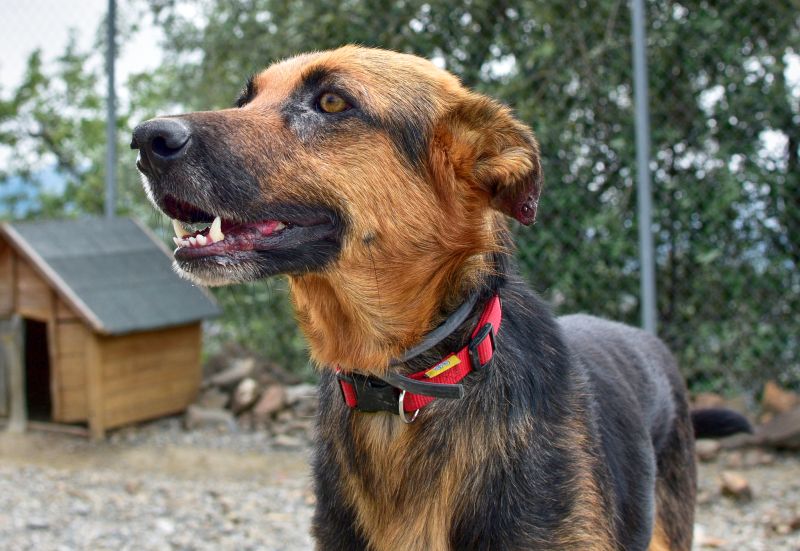
The Shepweiler is the adorable cross between two German breeds: the Rottweiler and the German shepherd.
While the breed doesn’t have a super well-documented history, it’s thought that these canine cuties first became popular in the late 1990’s, due to their dashing good looks and devoted, people-pleasing attitudes.
Most dog enthusiasts love the Shepweiler’s infectious spirit and unwavering loyalty, but not all homes are suitable for these unique mixed breed dogs. You’ll need to make sure that you can provide these pooches with the right amount of companionship, exercise, and care in order for a Shepweiler to fit in with your family.
German Shepherds and Rottweilers: The Shepweiler’s Parent Breeds
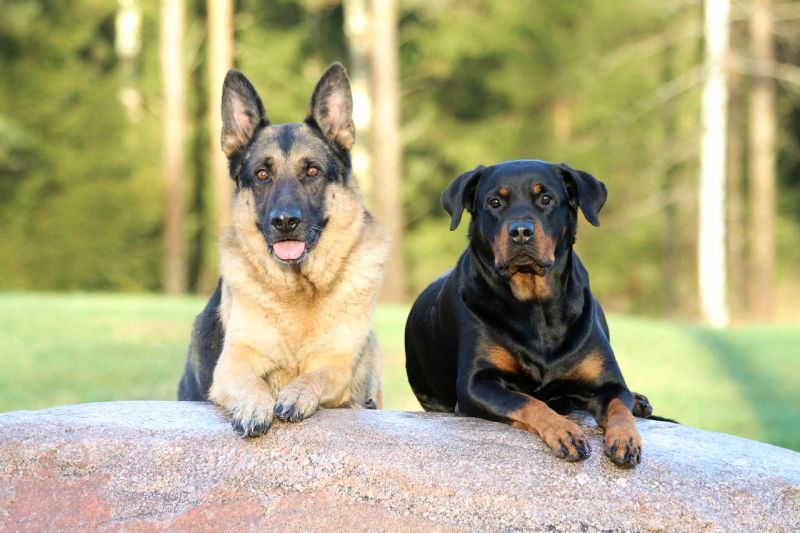
A great way to gain a deeper understanding of the Shepweiler is to take a closer look at the parent breeds, which we’ll do below. You should also meet your potential puppy’s parents if at all possible before bringing home your best buddy.
It’s important to note that there’s no guarantee that an individual Shepweiler will be a perfect 50/50 representation of his German shepherd and Rottweiler parents. But if you’re not comfortable with either parent breed’s traits, it’s best to look for another type of furry friend.
The German Shepherd Dog: A Confident and Courageous Companion
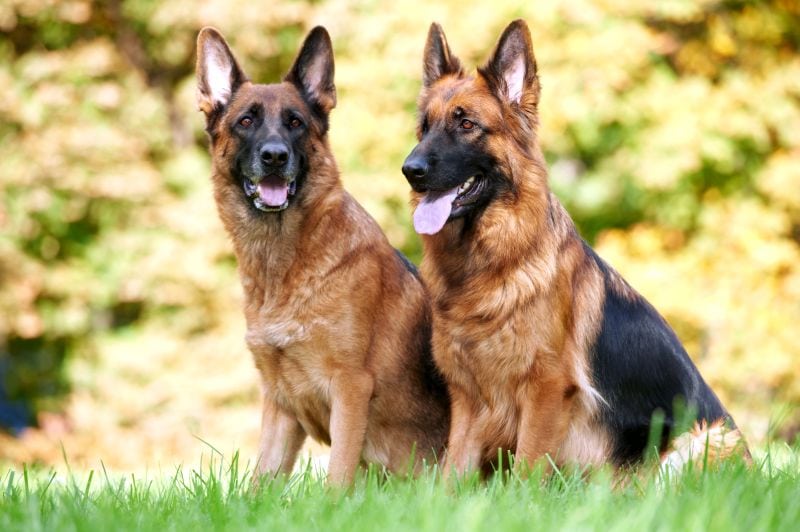
You’ll find that most German shepherds and GSD mixes are beloved for their 24-karat gold hearts, and tendency to cling close to your side in just about any situation. These dogs are all-purpose pooches who excel in service work due to their intelligence and strong work ethic. This is likely derived from the breed’s history as alert livestock guardians.
German shepherds are medium to large dogs, who usually weigh between 65 and 90 pounds. While these pups are incredibly playful and loving towards their family members, they can be aloof around strangers, so early socialization and training is paramount.
These dogs are also quite active and energetic, so they’ll need a family that can meet their intense exercise needs.
You’ll find that these popular pups are devoted, highly trainable companions, who are eager to please their family members. Just note that — like most popular types of shepherds — these dogs need plenty of exercise and playtime to prevent them from developing destructive habits.
Do note that German shepherds are susceptible to genetic conditions like hip dysplasia, bloat, and arthritis, so you may incur pretty substantial vet bills over time.
The Rottweiler: A Fearless and Devoted Family Member
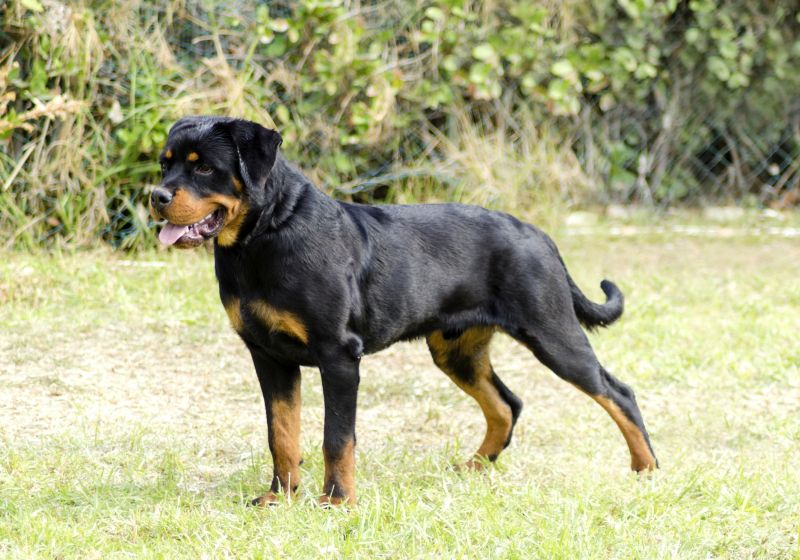
Rottweilers and most Rottie mixes are known for their loving and loyal natures, which come packed into an adorable black and tan coat.
Rottweilers were originally cattle-driving dogs, which speaks to their hardworking and highly trainable nature. While these pups serve primarily as companions today, they still need to be kept fairly engaged with training exercises and activities throughout the day to keep their tails wagging. Ideally, they should have a “job” to perform, as this will help keep them from growing bored.
These dogs are some of the most loving furry friends you can find, but Rotties can be aloof around strangers and protective of their families, so you’ll want to make sure you invest plenty of time into socialization. The breed is fairly large, typically weighing between 80 and 135 pounds. Unfortunately, this — combined with their frames — makes Rotties more susceptible to conditions like hip or elbow dysplasia and osteoarthritis.
Rottweilers are confident guardians, who are happy to play with anyone in the family, and they — like many other working dog breeds — bond very closely with their humans. Despite their large frame, these sizable sweethearts are known to act like lap dogs at home.
These sensitive family dogs make amazing four-legged friends to anyone who can meet their exercise and companionship needs, though they’re definitely not a good choice for first-time owners.
Getting to Know the German Shepherd X Rottweiler: The Shepweiler’s Traits and Characteristics
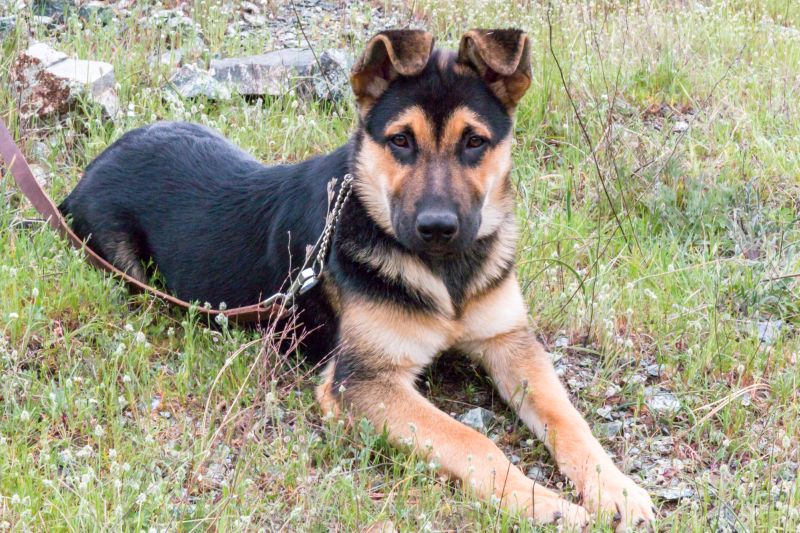
Are you hoping to take home one of these courageous canines? Here is a basic overview of the mutt’s prospective traits and characteristics. Just don’t forget the importance of meeting your puppy and his parents before committing to your canine companion.
- Size and Shape: You can count on your Shepweiler being a big best buddy, who will likely weigh between 75 and 115 pounds. They’re typically 22 to 28 inches tall though mixed breed pups can easily fall outside of this range. Shepweilers typically have a German shepherd-like frame, with the muscular build of their Rottweiler parent.
- Temperament: German shepherds and Rottweilers share a lot of similarities that come out in the Shepweiler. Most notably, these pups have an infectious zest for life and unconditional love for their family members. Shepweilers are known to cuddle with their family and friends and can be protective if they feel threatened around others. These dogs may be initially wary of strangers, so it’s important that they’re well socialized as puppies. However, to those they know, Shepweilers are total loving goofballs that are always happy to play a game of fetch or tug.
- Coat and colors: Shepweilers tend to have a black coat with tan markings or an all black coat, though this is rarer. The placement of the tan markings may be more reminiscent of the German shepherd or Rottweiler parent depending on the individual dog. These pups will likely have a short to medium length coat, and are unfortunately prone to shedding, so they’re probably not the best pick for those with dog allergies. Shepweilers also have large ears that should be cleaned regularly
- Intelligence: The Shepweiler is a super intelligent pooch with a great work ethic. You shouldn’t have any trouble training these eager to please sweethearts so long as you have a treat or two available. Since the Shepweiler descends from two working breeds, they’ll need to be kept mentally engaged to keep their tails wagging. Make sure your Shepweiler gets plenty of training sessions and time to explore the world around him. Having some quality puzzle toys around to keep him busy won’t hurt, either!
- Training Considerations: Since Shepweilers are hard workers and super smart, you shouldn’t have trouble training these furry friends. That being said, these sweet dogs can be somewhat sensitive so you’ll want to be as patient as possible and only use positive reinforcement training methods. It’s also important to note that these big best buddies have plenty of energy that needs to be focused into constructive outlets. You need to make sure your mutt learns his manners as a puppy so your Shepweiler’s size doesn’t become a safety concern. Shepweilers can also be somewhat protective of their families around others, so pay special attention to the socialization process.
- Energy Level: These enthusiastic best buddies have plenty of energy to spare, so you’ll need to make sure they get lots of exercise throughout the day. Shepweilers can make amazing running or hiking buddies so long as they’ve mastered their mutt manners and aren’t suffering from joint issues (check with your vet first to be safe).
- Health: Shepweilers usually live between 9 and 13 years. These mutts may be more susceptible to ailments shared by both pooch parents like hip dysplasia, and eyelid issues such as entropion and ectropion. It’s especially important to keep these big best buddies on a balanced diet since overeating can cause weight gain and add unnecessary pressure on a Shepweiler’s joints.
The Best Situations for Shepweilers: Is a German Shepherd X Rottweiler Mix Right for Your Family?
Every dog, including the Shepweiler, has his own set of unique needs that need to be met by a particular type of household. Make sure you can provide your Shepweiler with everything he needs to succeed with this comprehensive checklist.
- You love spending time outdoors. Shepweilers have plenty of energy that is best expended in the great outdoors. These designer doggos would thrive in a home with active owners, and preferably a large outdoor space though they can do well in just about any environment so long as their exercise needs are met.
- Someone is usually home. Shepweilers bond super closely with their family members and therefore do not like to be left alone for long periods of time. These pups appreciate a lively household and are happy to play with just about anyone in the family. Just make sure your pooch is properly trained to keep things safe while playing around kids and other pets. Special care is required around very young children, as these goofballs can be a bit clumsy, leading to accidental injuries.
- You have a good vacuum. Unfortunately, these furry friends are likely to shed and shed often. Make sure you have a great vacuum to make your job a little easier. Also, light colored furniture and carpet may not fare as well with the breed’s dark coat colors.
- You’re ready for a high-energy furry friend. The Shepweiler needs a home that provides him with plenty of mentally engaging activities to keep him busy throughout the day. Remember, the Shepweiler comes from two working breeds, so your dog will be relying on you to keep him adequately occupied. Your mutt will need an abundance of exercise and training sessions, and you’ll want to make sure your pooch is trained to greet others calmly and appropriately.
- You’re ready for a true furry family member. Shepweilers truly immerse themselves as a part of the family unit. Before bringing home one of these big best buddies, make sure you have another seat on your couch and space in your heart for a devoted family member that will always be there for you.
Shepweiler Not Right for Your Family? Consider These Breeds and Mutts!
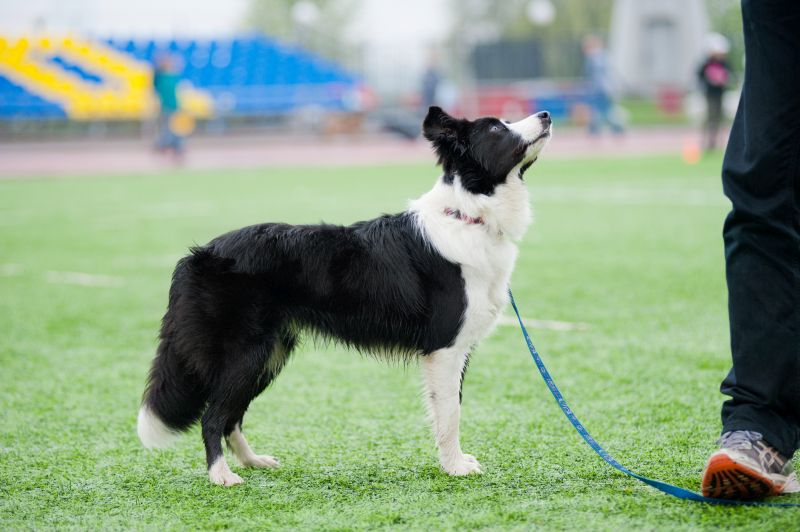
Not sure the Shepweiler is the perfect pooch for your family? Here are a few other breeds and marvelous mutts to take into consideration.
- Boxweiler: This adorable Rottweiler mix is a cross between the doting Rottie and rambunctious boxer. These comedic canines are sure to brighten your spirits every single day.
- Labrashepherd: The Labrashepherd is a German shepherd mixed with a loving Labrador. Labrashepherds are sweet family dogs that make happy go lucky canine companions.
- Border collie: If you’re seeking a sweet yet smart friend, the border collie is worth considering. These pups are sometimes considered the most intelligent dog breed, making them highly trainable. Border collies love spending time with their families, but also need lots of activity on a regular basis to keep them engaged.
- Rottle: This cross between a Rottweiler and a poodle produces a wickedly smart, playful pooch. These doting dogs tend to shed less than Rotties and Shepweilers, so they may make a good compromise for anyone who wants to cut down on their canine cleanup time.
- Australian shepherd: These smart herding dogs bond closely with their humans, so you’re sure to have a best buddy for life. Aussies are known for their active, exuberant personalities that are sure to add a little spice to your life.
- Pit bull: If you like the way Shepweilers bond with their people, yet need all that love and devotion in a slightly smaller (and shorter-haired) package, a pit bull type dog or pit bull mix may be just the doggo for you.
Where Can You Find a Shepweiler? How Much Do They Cost?
Finding a particular designer dog like the Shepweiler can be difficult. Here are a couple of places to start narrowing down your search.
- Start with an online search. Your best bet is starting scouring pet adoption websites or online databases like Petfinder to help determine whether there are eligible Shepweilers in your area. You can also filter results outside of your immediate town if you’re willing to travel.
- Seek out shelters. Many popular designer dogs sadly end up in shelters, so be sure to check local shelters and rescues for a Shepweiler. But before adopting your best buddy, make sure you have a clear picture of your dog’s history. Ask the shelter staff about your pup’s individual needs and personalities to make sure you can accommodate him properly.
- Ask other Shepweiler owners for guidance. Should you know any Shepweiler owners, you can inquire about where they found their furry friends. They may be able to refer you to their breeders, but be sure that you seek out a good dog breeder, who embraces compassionate and ethical practices.
The cost of a Shepweiler can vary greatly based on your area, the breeder, and the general availability of the breed. Shepweilers usually aren’t one of the most expensive dog breeds, but it’s still a good idea to get quotes from multiple breeders in order to get a sense of the Shepwiler’s current price range.
Don’t just go for the cheapest pooch you can find, either — this could be a sign that you aren’t working with a reputable breeder. Remember, you may pay more up front, but healthy dogs will cost much less in heartache and vet bills down the line.
Adoption fees are generally much cheaper than purchasing a pooch from a breeder, so it’s definitely worth searching for your furry friend from a rescue group or shelter. Just make sure you can fully accommodate the individual dog’s needs before committing to your canine.
***
Shepweilers make amazing canine companions for the right home. Just make sure you can provide these pups with the exercise and attention they need to keep their tails wagging.
Do you have a Shepweiler at home? Tell us all about him in the comments below!
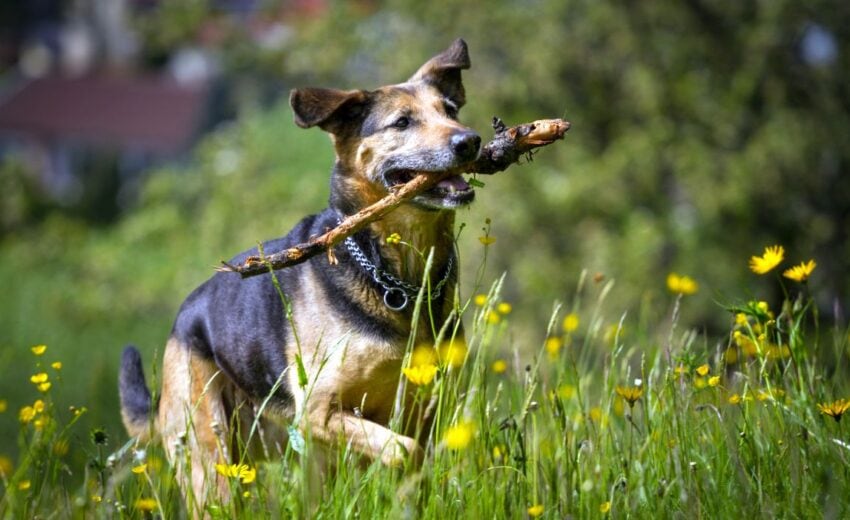
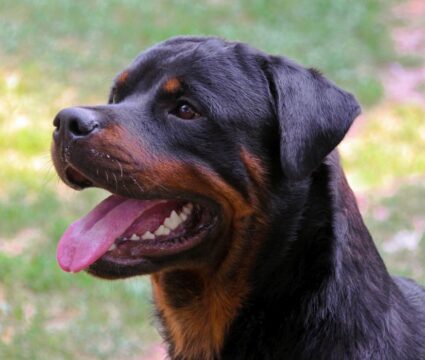






No Comments